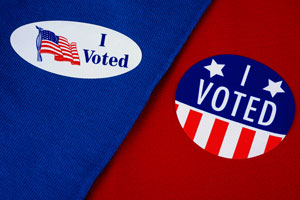Green Party presidential candidate Jill Stein asked for a recount in the three states with the closest election outcomes. The Wisconsin recount ended with President-elect Trump gaining an additional 131 votes. The Michigan recount was halted by a court ruling that Stein was not entitled to a recount since she had no hope of gaining enough votes to emerge as the victor.
While Stein sought a recount of paper ballots cast in Pennsylvania, most votes in that state are cast on direct-recording electronic (DRE) voting machines. Stein asked for a forensic analysis of the DRE machines to determine whether they had been hacked. A federal judge in Philadelphia denied that request after considering expert testimony from both sides, effectively ending Stein’s challenge to the election results.
Stein’s Claim
In 17 Pennsylvania counties, voters cast paper ballots that are counted by optical scanners. Since paper ballots can be preserved, the ballots can be recounted by hand.
In 54 Pennsylvania counties, voters cast their votes on DRE voting machines. Those machines preserve only a vote tally. There is no way to recount the votes if issues arise as to the accuracy of the tally.
Four Pennsylvania counties use a combination of optical scanners and DRE machines. Most Pennsylvania voters must therefore depend on the DRE machines if they want their votes to be counted.
Stein’s request was based on the concern that DRE machines are capable of being manipulated by hackers. Stein’s lawyer alleged that “DRE machines are easier to hack than an iPhone.” Even if DRE machines are easily hacked, whether the voting machines were actually hacked is a different question.
Stein’s suspicions were based in part on the CIA’s finding that “Russia intervened in the 2016 election to help Donald Trump win the presidency.” The CIA’s conclusion was based on Russia’s hacking of emails maintained by political organizations. Still, evidence that emails were hacked does not establish that voting machines were hacked.
Court’s Analysis
Following the reasoning of the state courts in Michigan, the federal court in Pennsylvania decided that Stein lacked “standing” to bring her lawsuit. Even if a recount were held, the court concluded, Stein would have no hope of winning the election. She therefore suffered no personal harm if the vote count was flawed. An allegation of personal harm is usually required before a party is entitled to bring a lawsuit.
Before bringing her federal lawsuit, Stein brought the same claim in Pennsylvania state courts. Those courts rejected her request. The federal judge decided it would be inappropriate to second-guess the state courts about election procedures that are determined by state law. In that regard, the judge’s reasoning departed from the Supreme Court’s Bush v. Gore decision, which declined to allow state courts to determine Florida’s election results in 2000.
Because the issues raised in the case are important, however, the judge analyzed the evidence to determine whether Stein’s claims had merit. The judge agreed that tampering with votes would impair the constitutional right to vote. To decide whether Stein had persuasive evidence of vote tampering, the judge considered the testimony of the expert witnesses.
Pennsylvania’s Expert
Dr. Michael Shamos has a Ph.D. in computer science as well as a law degree. He was “deeply involved in the creation and monitoring of Pennsylvania’s voting security procedures.” The judge agreed that Dr. Shamos is an expert in electronic voting, Pennsylvania’s election procedures, and computer science.
Based on Dr. Shamos’ testimony, the court concluded that votes in Pennsylvania are not tabulated on a single computer that is connected to the internet and thus susceptible to tampering. The judge also rejected the fear that “malware” might have been secretly installed on DRE voting machines or on vote tabulation machines, thus corrupting the results, based on Dr. Shamos’ opinion that the number of machines involved, and the security measures in place, would prevent any such hacking from occurring.
Dr. Shamos pointed out that the Russian hackers who tried to influence the election attacked email servers, while voting machines operate on different principles. He acknowledged the theoretical possibility that a DRE machine might be hacked despite the security measures in place to prevent that from happening, but dismissed the possibility of widespread hacking as bordering on the irrational.
Stein’s Expert
The court agreed that Stein’s expert, Dr. J. Alex Halderman, was qualified to testify about computer science, but determined that he “knew virtually nothing” about Pennsylvania’s security procedures or the practices of the state’s election officials. It is always a bad sign for a party when the court refers to the party’s “expert” in quotation marks.
Halderman admitted that he had no evidence of computer hacking and conceded that even if hacking occurred, it probably did not affect the election outcome. He relied in part on media reports of hacking in Illinois and Arizona, but the court discounted those concerns because they related to voter registration systems, not to hacks of off-line voting machines on election day.
Stein submitted the reports of four other experts, each of whom opined that DRE machines are vulnerable to hacking. The court discounted those opinions because they related to theoretical possibilities. In the absence of evidence that the machines were actually hacked, the court declined to delay certification of the election results while a forensic examination determined whether hacking occurred.
In the end, Stein raised important questions about the wisdom of voting on machines that do not permit a recount if the machines record inaccurate results, whether accidentally or due to outside interference. Since that question involves a policy judgment that is made by state legislatures, not by courts, and since Stein had no evidence that hacking occurred, the court gave more weight to Pennsylvania’s arguments (and the testimony of its expert) than to the concerns raised by Stein’s experts.




